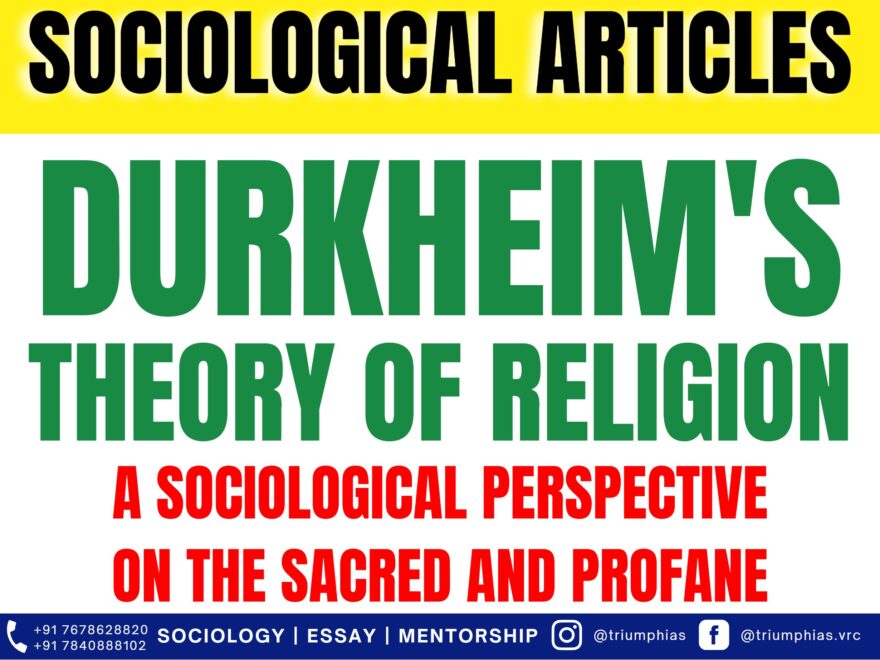
Religion and Society
(Relevant for Sociology Optional Mains (Paper 1 and Paper 2))

Durkheim’s seminal work, ‘The Elementary Forms of Religious Life (1912)’, is often hailed as his most profound and original contribution. Within this book, he provides a comprehensive description and analysis of the ‘clan system’ and the practice of “totemism in the Arunta tribe” of Australian aborigines. He develops a general theory of religion derived from the study of the simplest and most “primitive” religious institutions, and presents a sociological interpretation of the fundamental forms of human thought, which remains central to contemporary sociology of knowledge.
Durkheim initiates his exploration by challenging prevailing theories concerning the origin of religion. He dismisses Tyler’s notion of “animism,” which proposes spirit worship as the most fundamental form of religious expression. Similarly, he rejects Max Muller’s concept of “naturism,” which suggests the worship of natural forces. Durkheim finds both these explanations inadequate, as they fail to account for the crucial distinction between “the sacred and the profane” that permeates religious phenomena universally. Furthermore, he argues that reducing religion to an illusion, as these theories tend to do, undermines its significance and dismisses its profound impact on human experience.
Religion, for Durkheim, cannot be reduced to a mere love for spirits whose existence is affirmed or a reverence for natural forces instilled by human fear. Such reductionist views would reduce religious experience to a collective hallucination. Nor does religion solely revolve around the notions of mystery or the supernatural. Belief in a transcendent God is not the essence of religion either, as evidenced by religions like Buddhism and Confucianism that lack a central deity. Relying solely on spirits and supernatural forces would render religion illusory.

Durkheim finds it unacceptable to view systems of ideas like religion, which have held such a significant place throughout history, to be so profound and enduring if they corresponded to a true reality. And this true reality, according to Durkheim, is not a transcendent God but rather society itself.
Hence, the central thesis of Durkheim’s theory of religion posits that throughout history, humans have worshiped no other reality, be it in the form of totems or gods, than the collective social reality transfigured by faith. The essence of religion, according to Durkheim, lies in the division of the world into two distinct categories: the sacred and the profane.
The sacred encompasses elements that humans have designated as separate and requiring special religious treatment, such as religious beliefs, rituals, deities, or anything socially defined as sacred. Engaging in the sacred realm, through rituals and ceremonies, bestows a particular prestige, exemplifying one of the social functions of religion. Durkheim emphasizes that “the sacred thing” is that which the profane should not touch, as doing so carries consequences. The profane, on the other hand, represents the opposite of the sacred. The specific objects deemed sacred may vary infinitely across different religions, as the circle of sacred objects is not fixed once and for all.

- According to Durkheim, religion is defined as a cohesive system of beliefs and practices centered around sacred entities that are regarded as distinct and forbidden. These beliefs and practices serve to unite individuals into a singular moral community referred to as a Church, encompassing all its adherents.
- The binding force of religion lies in the shared beliefs and rituals that create a sense of social cohesion among people. The symbols and expressions of religious belief and practice do not pertain to the external world or individual human nature, but rather, they exclusively relate to the moral fabric of society.
- When exploring the origins of religion, Durkheim deviates from the concepts of animism and naturism and focuses on “Totemism” within Australian tribes. Ordinary objects, be they wood, stones, plants, or animals, assume a sacred status when they bear the emblem of the totem. The totem signifies an inherent belief in a mysterious or sacred force or principle that enforces taboos, instills moral responsibilities within the group, and imbues vitality into the totem itself.
- Consistent with his broader emphasis on the sociological analysis of social phenomena, Durkheim highlights collective activities as the birthplace of religious sentiments and ideas.
- For Durkheim, the essence of Totemism lies in the veneration of an impersonal, nameless force that is simultaneously immanent and transcendent. This diffuse, superior force is none other than society itself, intimately connected to individuals.
- Furthermore, Durkheim posits that just as past societies have created gods and religions, future societies are inclined to generate new deities and belief systems during periods of heightened enthusiasm. When societies become enraptured with the sacred, and individuals partake in ritualistic ceremonies, religious services, feasts, and festivals, a collective trance takes hold. Dancing, shouting, and the immersive experience of this collective frenzy transport individuals beyond their ordinary reality. It is within these moments that new gods and religions emerge.
- Durkheim believed that he had resolved the religious-moral predicament of modern society. He maintained that religion is essentially the indirect worship of society itself. In the modern era, people need only direct their religious sentiments towards the sacred symbols representing society. The collective life of society serves as both the source and object of religion. Durkheim argues that individuals who feel dependent on an external moral power are not victims of hallucination but rather responsive members of society.
- Durkheim asserted that the fundamental role of religion is the establishment, reinforcement, and preservation of social cohesion. It functions as a mechanism of social control and solidarity. According to him, religious phenomena arise in any society when a distinction is made between the profane realm of everyday practical activities and the sacred realm that pertains to the transcendent and extraordinary.
- In Durkheim’s perspective, religion is not merely a product of social construction but rather society itself deified. He contended that the deities worshipped collectively are nothing more than projections of society’s power. If religion essentially represents the transcendent qualities of society, the decline of traditional religious practices does not necessarily signify the dissolution of society. Moreover, Durkheim reasoned that modern individuals merely need to directly recognize their dependency on society, a recognition that was previously mediated through religious symbolism.
- At its core, religion as a social institution serves the purpose of providing meaning to human existential dilemmas by connecting individuals to the supra-individual realm of transcendent values, which ultimately find their roots within their own society.
Critical Evaluation:
- Durkheim’s study of religion exemplified the effective application of functionalist methodology in sociology, leaving a lasting impact on the subsequent works of B. Malinowski and A.R. Radcliffe-Brown. His assertion that the concept of the sacred and the accompanying beliefs serve as symbolic representations of society itself has found support in the later research conducted by Guy Swanson.
- Swanson conducted a comparative analysis of religious beliefs in simple societies organized around kinship principles and the complex, highly differentiated societies of the present. His findings revealed that kinship-based societies lacked the notion of a single god and did not possess any ecclesiastical organization that competed with the kinship structure. Instead, they tended to practice a totemic form of religion that symbolized and fortified the kinship system. In contrast, highly differentiated societies, such as kingdoms or nations, tended to embrace a belief in a singular supreme deity. This belief in a single god served as a unifying force for the members of the society and contributed to maintaining social solidarity. Consequently, the nature of religious belief corresponded to the nature of the social structure, as posited by Durkheim.
To master these intricacies and fare well in the Sociology Optional Syllabus, aspiring sociologists might benefit from guidance by the Best Sociology Optional Teacher and participation in the Best Sociology Optional Coaching. These avenues provide comprehensive assistance, ensuring a solid understanding of sociology’s diverse methodologies and techniques.
Durkheim, religion, sacred, profane, society, sociology, totemism, Australian tribes, social construction, symbolic representation, Durkheim, religion, sacred, profane, society, sociology, totemism, Australian tribes, social construction, symbolic representation, Best Sociology Optional Teacher, Best Sociology Optional Coaching, Sociology Optional Syllabus

